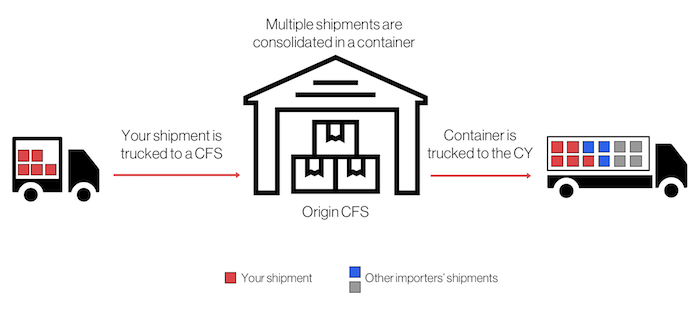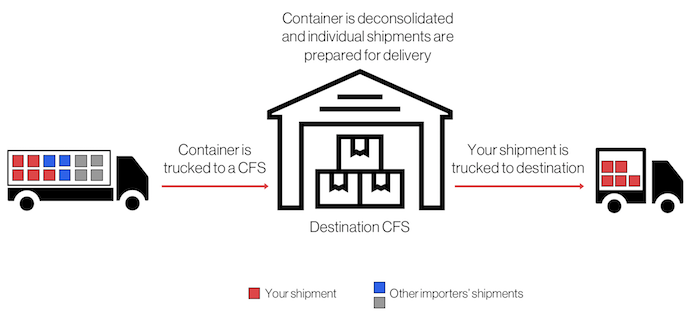NEWS
What is a CFS (Container Freight Station)?
Release time:2024-03-25 15:01
What is a CFS (Container Freight Station)?
A Container Freight Station (CFS) serves as a specialized warehouse designed for consolidating and deconsolidating various shipments. It plays a crucial role in managing Less than Container Load (LCL) shipments. These shipments are initially brought to a CFS, where they are consolidated with other cargo into a single container. This consolidated container is subsequently transported to a Container Yard (CY), in preparation for its loading onto a shipping vessel.
$1500 Coupon for New Customers on LCL Shipping here

After the container arrives at the destination port, it will be taken to another CFS for deconsolidation. LCL shipments will then be picked up from the CFS for final delivery.

Both the origin and destination CFS will charge a container freight station fee.
What is a CFS fee?
A container freight station fee is assessed for LCL shipments.
After arriving at the destination port, LCL cargo is taken to a container freight station (CFS) to be deconsolidated; after that, it’s loaded into a truck and transported to the final destination. The CFS charges a fee for this deconsolidation service, based on the volume of the cargo.
If you are shipping LCL and your incoterms include origin charges (e.g., Ex Works), you will also see a container freight station fee under Origin Charges on your Flexport quote/invoice. This fee covers the CFS service at the point of origin, when the cargo is consolidated to prepare for shipment.
CFS Warehouse Fees vary among different providers, making it crucial to compare and confirm the charges, especially for ocean LCL shipments. Notably, freight forwarder consolidators might have unique contracts with the warehouse, leading to variable fees charged by the CFS based on the forwarder utilized. To support new customers in navigating these fees, we're offering a special promotion: a $1500 Coupon for New Customers on LCL Shipping here, aiming to provide a more accessible entry into the logistics process.
Types of Container Freight Stations
Origin CFS: Situated in the country where the shipment originates, these facilities focus on consolidating various freight into containers before they are transported to their destination. This step is crucial for streamlining the shipping process, ensuring that goods are efficiently grouped for transit.
Destination CFS: Located in the destination country, these stations handle the de-consolidation of freight. Upon arrival, containers are opened, and individual shipments are separated and prepared for delivery to their respective recipients. This process ensures that each shipment reaches its intended destination effectively.
What is a Bonded CFS Warehouse?
A Bonded Container Freight Station (CFS) Warehouse represents a specialized facility authorized by Customs & Border Protection to hold imported and exported goods temporarily. Being "bonded" signifies that the warehouse can safely store shipments under customs bond, essentially postponing the payment of customs fees and duties.
Such a setup allows goods to reside within the warehouse pending customs clearance, with the unique advantage of deferring fees and duties while under the warehouse's care. Depending on the warehouse's specific bonded status, this deferral can extend up to five years if the goods remain within the facility.
They are different from the Free Trade Zone (FTZ) warehouses where goods in transit may be stored for longer periods of time. CFS warehouses are critical in both ocean and air freight.
Air Freight
Before being loaded onto the aircraft, goods must be stored at the airport's warehouse, which may be operated by a CFS warehouse operator or a third-party manager. At the destination, the goods must also be stored in a CFS warehouse until the appropriate documentation is provided to CBP, after which CBP will release the goods to the public. The required documentation was known as AMS (Automated Manifest System) air waybills before the upgrade to ACE (Automated Commercial Environment) Air electronic manifests.
Container Freight Stations typically provide AMS Air services to customs brokers and importers/freight forwarders. Once the goods are under their custody, they control and track the status of the cargo through cargo status notification messages.
For non-consolidated shipments, the airway bill number is used as the bond control number.
For consolidated shipments, the master air waybill and associated house waybills must also be submitted to CBP before the goods are released from the CFS.
Ocean Freight
At the port of origin, the primary use of a bonded CFS (Container Freight Station) is to consolidate cargo and load it into containers for Less than Container Load (LCL) shipping. Before the cargo is loaded onto the ship at the port of origin, ocean carriers or their authorized agents will require an ACE (Automated Commercial Environment) eManifest Ocean. The reporting time is 24 hours before loading at the foreign port of origin.
The ACE electronic manifest provides a comprehensive view of all ocean freight, bill of lading data at the manifest and container level, and the details of consolidated or deconsolidated cargo.
Upon arrival at the destination, ocean LCL cargo is sent to the CFS warehouse, where it is segregated and offloaded.
Benefits of Using CFS Warehouses
They are highly suitable for time-sensitive air freight, as they facilitate the rapid and direct transport of such cargo from airports, delivering to various destinations within a few hours to a few days.
They enhance supply chain efficiency, especially for businesses involved in regular import and export activities, where goods require short-term storage before being unboxed, repackaged, and prepared for delivery to the final recipient.
CFS warehouses are ideal for businesses in need of dedicated Less than Container Load (LCL) services, as they do not have the capacity for Full Container Load (FCL). This can lead to significant cost savings for businesses.
When goods are transported directly from ports or airports to the secure premises of Container Freight Station warehouses, they offer an added layer of security, reducing the risk of theft or damage.

 Free Quote
Free Quote





